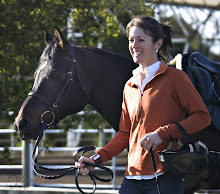Learning any new sport brings its own challenges, but in terms of unusually large and sometimes cruel learning curves, horseback riding takes the top spot. Not only must a new student learn to wrangle her body into never-before-experienced poise and isolation but she also needs to simultaneously wrangle the 800-pound beast under her with polish and grace. Keep in mind that at any moment, said beast is prone to his own whims, disinterest, and overall lack of enthusiasm. Or worse. This makes learning to ride-- an already formidable challenge-- far more difficult than other sports. A student learns to proceed with a noted amount of flailing, spastic gestures, and jiggly balance.
The ultimate unfairness of this learning curve surfaces when a student has the opportunity to watch a trainer ride in graceful effortless harmony. It will appear that the trainer is sitting atop the horse doing...nothing. Where is the flailing? The bungling? The pinched up, frustrated facial expressions? Of course the student acknowledges that such skilled riding style comes from years of mastery and she might one day possess it, too, but in the meantime, she allows herself some good old-fashioned envy because she knows she's a long way from riding like her trainer.
At this point, something interesting happens on the learning curve. It is something that coaches from other sports never witness. Sure, they will deal with frustrations, egos, and emotions of their students and players. But they will never encounter the creativity that riding students eventually adopt in finding explanations for why their progress is so slow. That awkward beast under them eventually becomes a really convenient excuse on days things are not going well. We have each fallen into this at some point, for instance on the day we are bouncing around attempting a decent sitting trot with our coach yelling at us when, exasperated, we announce that we would be able to manage the sitting trot just fine if only our horse would give us a smooth trot to sit. Or we'd be able to give the right cues if only he would pay attention. He's the reason for our sub-par performance, not us, we tell our coaches. In time, this line of reasoning gives riders a handy and consistent way to explain the glacial speed of their skills progressing.
And what pleases the human mind more? What satisfies us more than believing that we are hindered exclusively by factors other than ourselves? What else allows us to go around thinking we're A LOT better at something than we actually are?
I pondered all this recently while struggling through a swim lesson. As a kid, I never learned to swim and now as an adult it seemed ridiculous, so I went to a local pool and signed up with a coach. "This is going to be really fun," I told myself the first day, much like new riding students probably tell themselves driving to the barn. I shimmied into my swimsuit, jumped into the water, averted drowning and felt like I was well on my way to being a decent swimmer. In fact, I held all the same beliefs of beginning riding students: I am an athletic, capable, quick-learning woman; how hard can this be? Just moments after thinking I was well on my way to becoming a decent swimmer, I found myself unintentionally upside down and unable to get my bearings back. I tried paddling my arms, which only flipped my body around in circles like a rotisserie chicken. Through my goggles, I saw sky, bottom of the pool, sky, bottom of pool, sky....
My coach jumped in and rectified matters, allowing me to sputter chlorine out of my ears and nose. Then, immediately, I hurried to find an explanation. Surely, the episode could not be explained simply by the fact that I was a very bad swimmer. No, there needed to be another reason I was flailing in three feet of water. Could it be the pool temperature? A clothing malfunction? Interference from another swimmer? But when you're doing a sport with no equipment, no teammates, and very little clothing to malfunction, you realize quickly-- and rather disgruntled-- that there isn't anywhere to put the blame except on yourself. Ouch. Yes, the reason I tended to bob up and down like a buoy at high tide rather than execute a graceful breast stroke was the fact that I was a very bad swimmer. There was no way around this. Unlike a few moments prior, I acknowledged that cows might fly before I became a decent swimmer. "This is not going to be fun at all," I told myself on the drive home, wet hair dripping down my back. Humbled and deflated, I tried to find a silver lining in the reality that I was pathetically unskilled at this new sport I hoped would bring me a lot of happy hours.
At least it brought me in touch with the tribulations that my riding students go through. It gave me a taste of their frustrations and hopes and failures. This, I believe, helps make me an effective coach for them. Yet, in my humbled state, I couldn't help feeling that they were far better off than me. At least they had a horse to blame! They had something with which to assuage their failures, like a hearty dose of putting the blame on something else. I will assure you that this is much preferable to standing in a swimming pool realizing that there is nothing-- nothing!-- to use as an excuse for sub-par performance. So, be forewarned that the next time one of my students gets frustrated in the saddle and questions why on earth she has taken up this cruel sport, I will tell her she has no idea how good she has it.
Monday, May 3, 2010
Subscribe to:
Comments (Atom)




